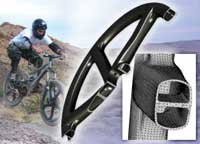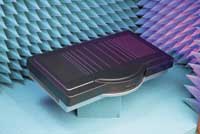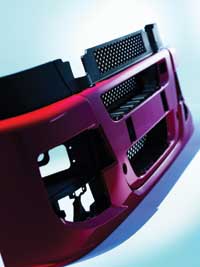Beyond obvious applications within medical, antimicrobial technologies like Biosafe’s could see broad application in a variety of germ-rich environments.
March 1, 2008
|
Within the medical market, resins that can withstand the thermal rigors of sterilization have long been sought after, but a growing class of materials is promising inherent resistance to germs. Examples of so-called antimicrobial materials were launched at January’s Medical Design & Manufacturing exposition (MD&M; Anaheim, CA; organized by MPW owner Canon Communications), with offerings from resin manufacturer Bayer MaterialScience (Leverkusen, Germany) and specialty compounder RTP Co. (Winona, MN). Recent announcements on such materials have also come from thermoplastic sheet supplier Kleerdex Co. LLC (Bloomsburg, PA) and rigid plastic packaging processor M&H Plastics (Suffolk, England).
At last year’s MD&M, Kevin Dunay, medical market segment leader for Bayer, detailed some of his company’s work with antimicrobials, and at this year’s event, the company launched two developmental grades of its Makrolon polycarbonate (PC)—DP1-1868 and DP1-1869—with antimicrobial properties for medical devices. The company pointed to the need for such materials based on a Centers for Disease Control study which found that there are 4.5 hospital infections for every 100 patient admissions, with nearly 100,000 infection-related deaths in hospitals in 2002. Dunay says Bayer is using a silver nanoadditive with compounds featuring the nominal and maximum allowable amounts added per FDA regulations. The company says the additive has the potential to control the generation of Gram-positive (bacillus, listeria, staphylococcus) and Gram-negative (e-coli, salmonella) bacteria.
Silver alternative
RTP used MD&M to announce an agreement giving it exclusive sales and manufacturing rights to Biosafe Inc.’s (Pittsburgh, PA) silane-based antimicrobial. RTP Marketing Communications Specialist Stacy Sterling told MPW that the patented concentrate, based on silicon-derivative silane, can be used as an additive or masterbatch in extrusion and injection molding. Unlike Bayer’s offering, and many competitive products, Biosafe’s technology does not apply silver, for what RTP calls a cost-effective faster-acting alternative, without the discoloration that silver can cause. Donald Wagner, Biosafe business development VP, stated in a release that his company’s product adds $0.25 to $0.50 to the finished-plastic product’s raw material costs per pound. By comparison, Wagner said silver ion antimicrobials can add $0.75 to $1.50 per pound of end product.
Biosafe’s plastic product, HM 4100 Antimicrobial, comes as a solid crystalline powder or in a masterbatch. The active ingredient of the additive has effective loading ratios of 0.25-0.5% (2-3% let-down ratio of the additive into the final polymer), and in high-clarity resins, Biosafe says it doesn’t compromise optics. As opposed to antimicrobials that kill germs by leaching into the cell—a method that can allow bacteria to mutate to a resistant form—silane-based antimicrobials puncture and rupture bacteria cells. Biosafe takes between one and four hours to effectively reduce microbials on plastic surfaces.
The companies point out that since the biocide is chemically bonded to the polymer, it won’t leach or off gas, so it does not lose effectiveness over time.
Antimicrobial sheet, packaging
For the thermoforming market, thermoplastic sheet supplier Kleerdex has attained exclusive rights to produce roll stock with Microban (Charlotte, NC) antimicrobial. Intended for healthcare-equipment enclosures and airline-interior components, Microban wards off microbes that lead to odor- and stain-causing bacteria, mold, and mildew. Kleerdex will offer Microban as an option for its Kydex T MB, XD MB, 150 MB, and 5555 MB products.
M&H Plastics, which through its health- and personal-care unit offers more than 900 standard products, including, bottles, caps, and jars, has launched a line using ionic silver for antimicrobial properties. The company says the product inhibits fungal growth, kills over 99.99% of bacteria within 24 hours, and is effective over the lifetime of the product. The company, based in England, says the additive is recognized by the UK’s National Health Service.
In practice, bacteria that consume something on the surface of an antimicrobial plastic will ingest a silver ion, making the cell wall unable to close, which precludes it from reproducing so that it dies off. M&H says the product is ideal for a wide range of cosmetics, toiletries, and personal-care products.
RESINS/COMPOUNDS
|
Acrylic grade improves thick parts molding
This resin maker has extended its range of specialty acrylics with Altuglas VML, designed specifically for molding high-thickness, transparent objects where exceptional purity is required. For very heavy or large components, a processor generally has to cope with several shape problems. At high temperatures, parts are often easily molded but cycle times are long and components tend to take on a yellow tint due to thermal stability problems. At low temperatures, cycle times are often good, but friction in the injection press is often high, spoiling the appearance. Another problem can arise with using standard lubricants to reduce friction. These can change the part transparency. VML promises to eliminate these problem areas by processing at low temperatures (180-220°C) and offering good cycle times.
Altuglas International, Arkema, Paris, France; +33 1-7866-2327
Mountain bike wheel lost-core molded from nylon
TAG Wheels (Newport Beach, CA) has opted for Zytel 8018 to mold its FRX5 mountain bike wheels using a lost-core process in order to deliver the required toughness, strength, and stiffness. The resin consists of PA66 polymer modified with DuPont Engineering Polymers (toughening) technology and reinforced with glass fibers (14 wt%).
The FRX5 is an innovative, one-piece design that optimizes structural strength, impact resistance, and functionality. Wall sections vary in thickness to provide additional strength and stiffness where needed. Each spoke has an internal rib. The hub shell is a robust, thick-walled construction, and it is keyed to optimize shear resistance and torque transfer, according to George Kotzeff, president of TAG Wheels.
The design minimizes pinch flats with a relatively thick, flat-topped bead and a resilient rim. The rear wheel has an integral chain-catcher feature to combat chain binding. Another advantage of the FRX5 lies in reduced maintenance. It never requires the truing, tension, or alignment procedures needed for wire spoke wheels, according to the company.
DuPont Engineering Polymers, Wilmington, DE, U.S.A.; +1 302-999-4592
TPU improves conveyor drive-belt durability
This grade of thermoplastic polyurethane (TPU), Estane X1222, is said by its producer to significantly improve durability in drive-belt operations for conveyor systems. Accelerated testing of round drive belts made from the product also shows an improvement in service-life expectancy or time-to-break failure, claimed to be up to three times longer than competitive TPU-based belt products. Durability improvements are credited to the compound’s good creep resistance, which gives rise to low abrasion and low belt slippage during operation, says Ralf Hüther, marketing manager at the producer.
Noveon Inc., The Lubrizol Corp., Cleveland, OH, U.S.A.; +1 888-234-2436
Nylon grade grows from renewables
This polymer producer has developed and introduced a new nylon 6.10 grade, Ultramid Balance, that consists of more than 60% sebacic acid, which is a renewable raw material derived from castor oil. “Given that interest in materials based on renewables has risen sharply in many markets, we have decided to bring the product back into our range,” says Kurt Hoefili, head of marketing of the company’s engineering plastics/Europe division. The material combines the relatively low density of nylon with good low-temperature impact resistance. It also has good dimensional stability due to its low moisture absorption. It can be employed not only as a classic nylon 6 replacement but also in applications that in the past have opted for a different resin because of nylon’s hydrophilic nature.
BASF, Ludwigshafen, Germany;+49 621-6043348
|
Compounds boost EMI/RFI shielding
This supplier has expanded its range of LNP Faradex family specialty compounds to include new grades said to offer better electromagnetic interference/radio frequency interference (EMI/RFI) shielding without an increase in the compound’s loading of stainless steel fibers, thereby keeping costs and part weight down. Modulus has also been increased by 33% or more to enable molding of thinner walls at equivalent strengths.
The five new LNP Faradex compounds are PC/ABS (polycarbonate/ acrylonitrile butadiene styrene) alloys. Three include non-brominated, non-chlorinated flame retardants. Two are not flame retardant but offer higher impact resistance than previous LNP Faradex compounds. Varieties of other base resins are also available based on customer requirements.
Applications for the flame-retardant grades include enclosures for small or medium-size electronic devices. The non-FR grades could see use in digital camera housings and audio systems in vehicles.
Sabic Innovative Plastics, Pittsfield, MA, U.S.A.; +1 413-448-7110
|
Resin drives new truck developments
Nepol GB303HP long-glass-fiber-reinforced polypropylene (PP) is playing a pioneering role in an injection molded truck bumper and front panel for the Stralis truck series produced by European heavy-duty vehicle producer IVECO. This grade replaces parts compression molded of unsaturated polyester with glass-fiber reinforcement. It reduces production complexity while meeting mechanical and environmental requirements specified by IVECO.
Injection molded by Tier One supplier Plastal (Kungälv, Sweden), these structural components were able, in a single mold, to achieve the needed aesthetic and mechanical requirements. Due to fewer production steps, both time and material waste were reduced. The material’s mold flow helped ensure consistency at fast line speeds during processing.
IVECO received a front panel and bumper that weighed 30% less compared to the previous version. GV303HP also has good sound reduction performance. It has good impact/stiffness ratio and offers dimensional stability at high temperatures.
Borealis, Vienna, Austria; +43 1-22-40000
ADDITIVES
Increased dimensional stability provided
Just 0.3% Bruggolen TP-P7011 crystallization accelerator processing aid in 30% glass-fiber-reinforced nylon 6 applications can increase dimensional stability and eliminate both shrinkage and warpage in nylon compounds and masterbatches, according to the firm. These additives reduce the cross-to-length ratio of shrinkage, therefore warpage is less than with competitive materials, the company claims. Hardness and crystallinity as measured in DSC and Mohs can be increased and it also helps embed the glass fibers, which can result in better surface quality. Melt flow and mold release of parts can also be improved.
Brüggemann Chemical, Heilbronn, Germany; +49 7131-1575111
Only low loadings needed for this FR
Flexible foam producers and users such as in the furniture and automotive seat sectors now have what this manufacturer says is an environmentally appealing alternative for flame retarding. Antiblaze 117HF is a halogen-free flame retardant (FR) that is said to achieve the same protection as existing FRs with up to 30% less addition. The additive also gives good non-scorching performance. Using U.S. Environmental Protection Agency criteria, the product was found to be non-persistent and non-bioaccumulative, says Steve LeVan, the company’s VP for FRs.
Albemarle Corp., Richmond, VA, U.S.A.;+1 225-388-7904
MASTERBATCHES
Masterbatch clears foggy microwaved packages
VF150MW is an antifog masterbatch for use in microwaveable polyolefin food packages. It meets FDA 21CFR 176.170c Table 2, b–h, which defines the conditions of use and includes exposure to boiling water for some foods. VF150MW antifog performance is excellent as rated by ICI’s visual rating system for hot food packaging.
Polyvel, Hammonton, NJ, U.S.A.;+1 609-567-0080
LITERATURE CORNER
Weathering information handbook is updated
The fourth edition of the “Handbook of Material Weathering,” authored by George Wypych, includes new data and information integrated with information included in previous editions. In many instances, reports the publisher, new findings make previous understanding obsolete. It also covers topical issues such as material durability, conservation of energy and resources, and protection of the environment. The 810-page book includes 828 figures and 65 tables.
ChemTec Publishing, Toronto, ON, Canada
Bioplastics eyed in updated report
The Fraunhofer Institute for Chemical Technology together with the Institute for Recycling and bioplastics24.com has published an updated technical report that analyzes 73 globally available biopolymers. The market report provides information on technical parameters and processing characteristics of 73 globally available biodegradable plastics and plastics made from renewable resources.
The report, first published in 2006, has been updated and extended with information on more than 20 new bioplastics included. A comparative analysis also investigates differences and consistencies between bioplastics and conventional plastics in key parameters such as impact strength and E-modulus. The report also includes a new section with an introduction to natural-fiber-reinforced plastics.
For more information and to view the table of contents, visit the website.
Clean Tech Consulting GmbH, Hamburg, Germany; +49 40-7166-6304
About the Author(s)
You May Also Like






